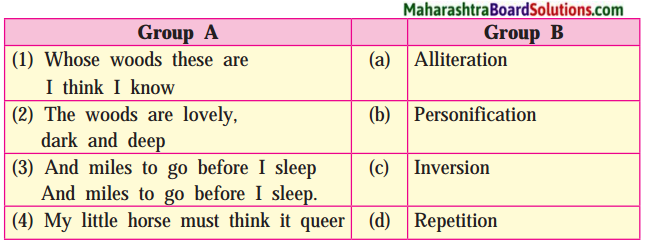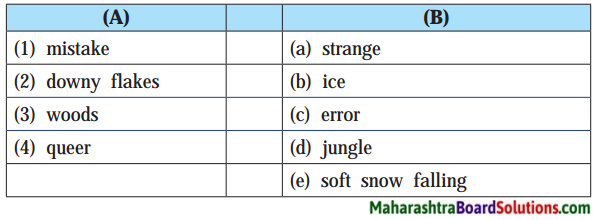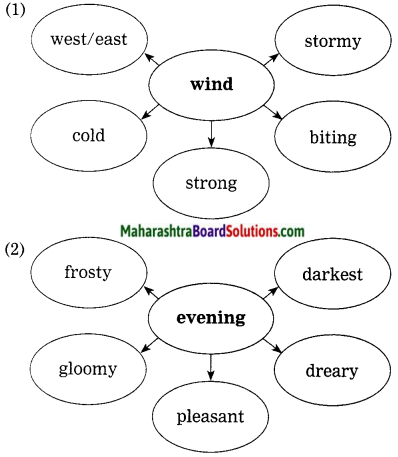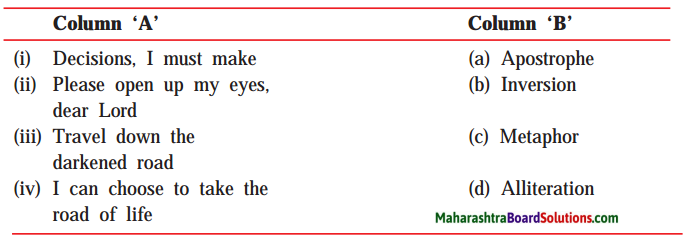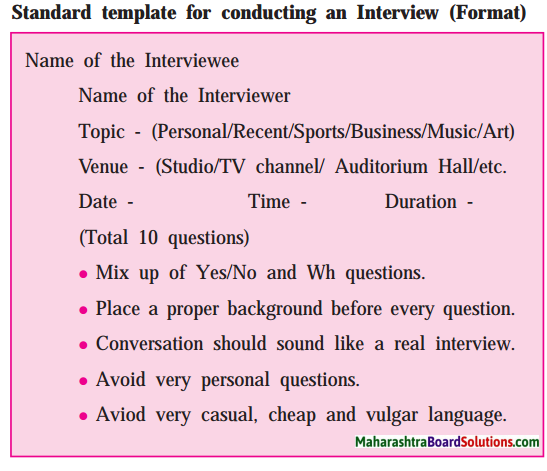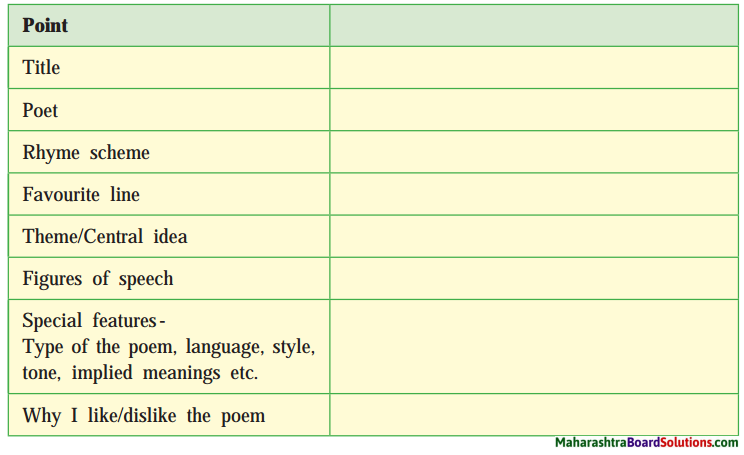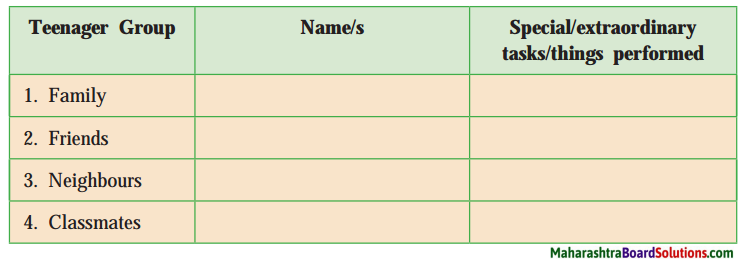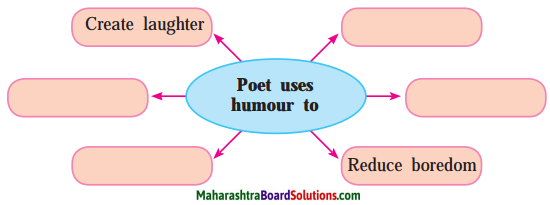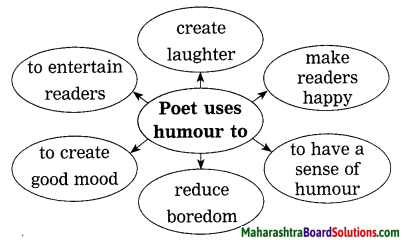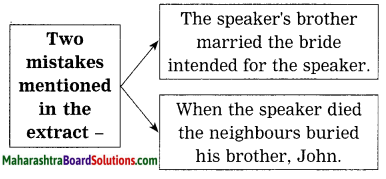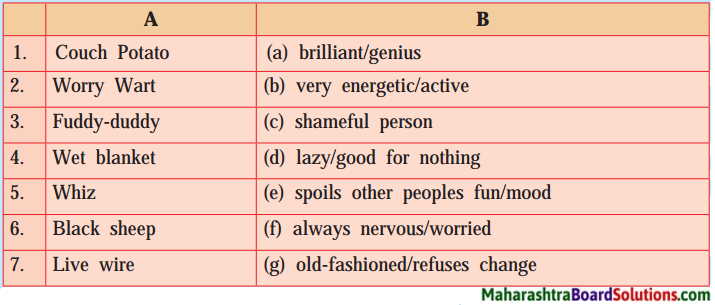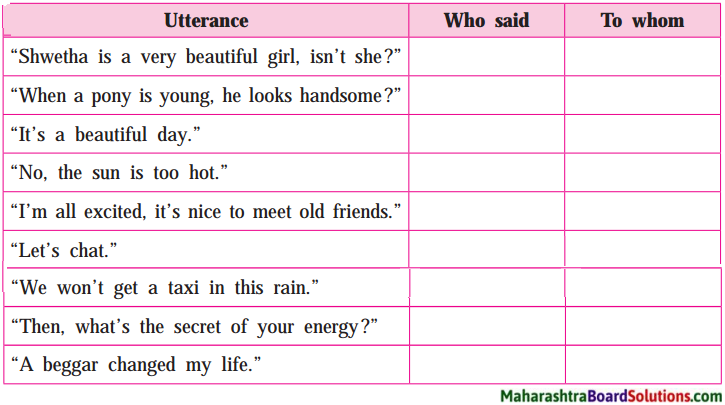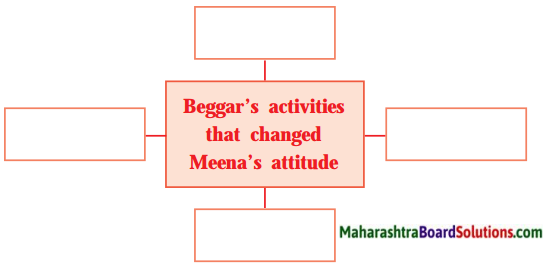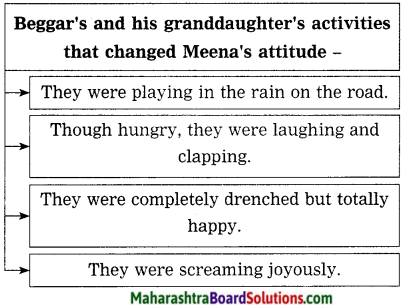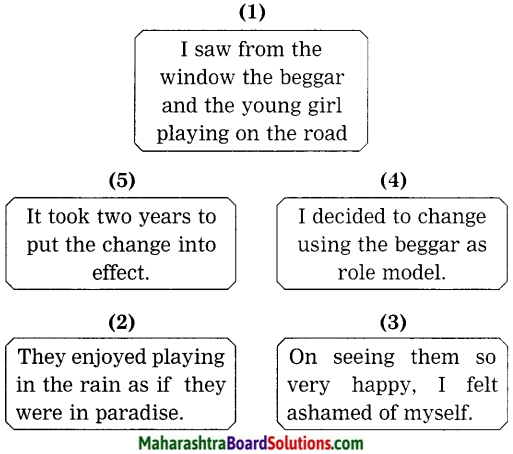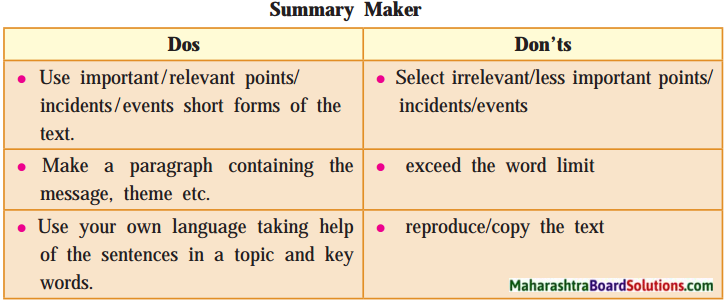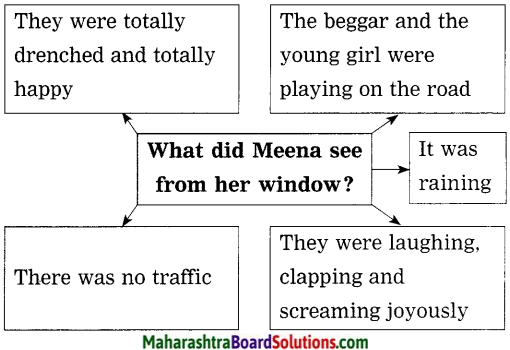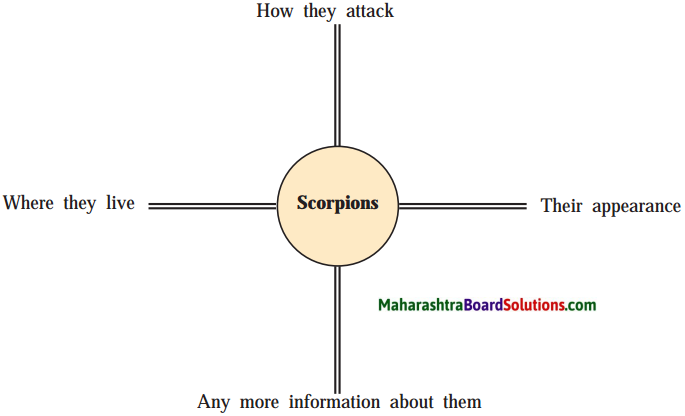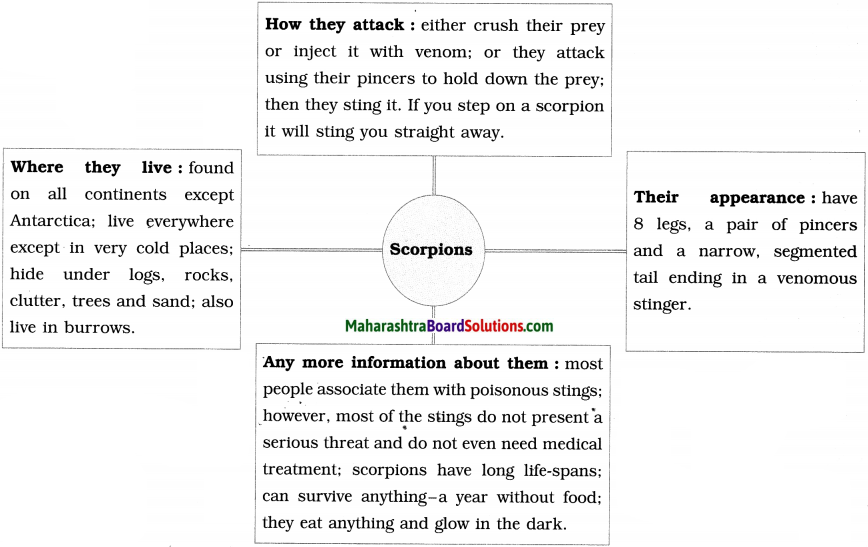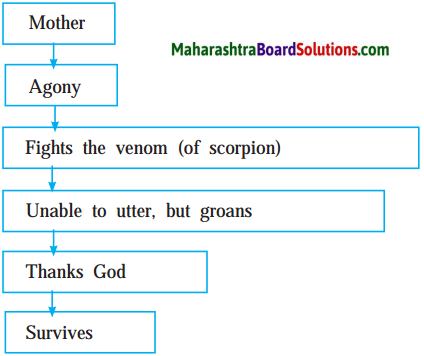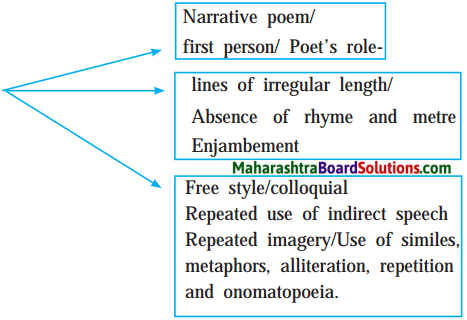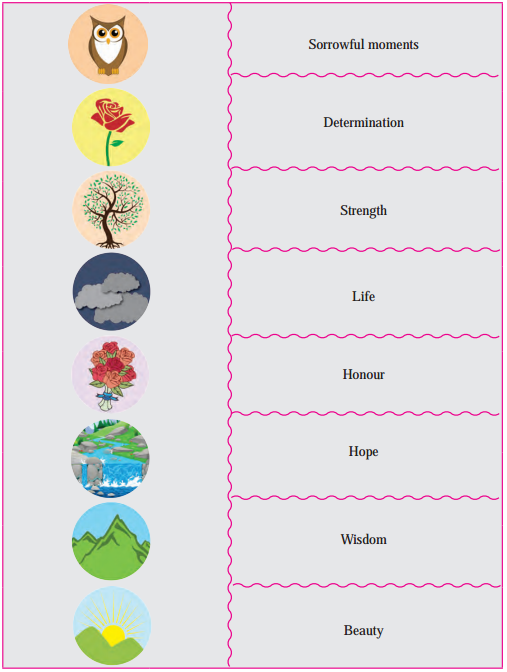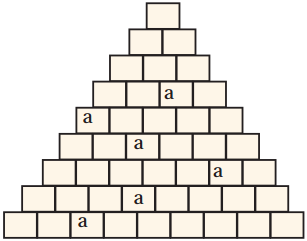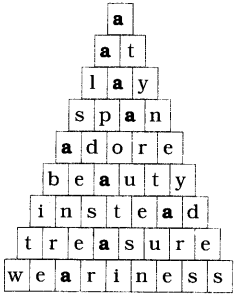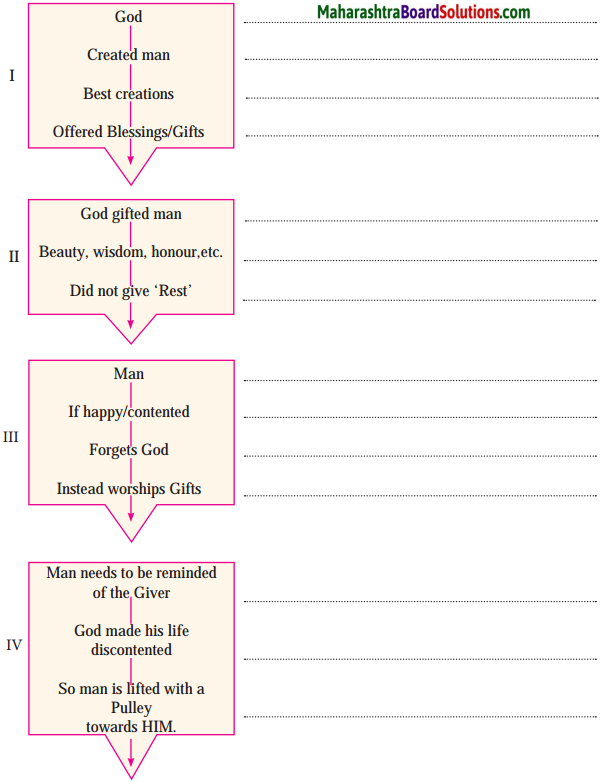Class 10 English Chapter 1.3 Question Answer Maharashtra Board
Balbharti Maharashtra State Board Class 10 English Solutions Unit 1.3 On Wings of Courage Notes, Textbook Exercise Important Questions and Answers.
On Wings of Courage Poem 10th Std Question Answer
Maharashtra State Board Class 10 English Solutions Unit 1.3 Warming Up Questions and Answers
Question 1.
The ranks of officers in Indian Army, Navy and Air Force are jumbled up. Discuss with your group and put them in the appropriate boxes.
| Commander, Brigadier, Wing-Commander, Vice-Admiral, Squadron-Leader, Major, Colonel, Field Marshal, Air Marshal, Admiral of Fleet, Lieutenant-General, Flying Officer, Commodore, Rear Admiral, Air-Commodore. |
| ARMY | NAVY | AIR FORCE |
Answer:
| Army | Navy | Air Force |
| Brigadier, | Commander, | Wing- |
| Major, Colonel, | Vice-Admiral, | Commander, |
| Field Marshal, | Admiral | Squadron- |
| Lieutenant- | of Fleet, | Leader, Air |
| General | Commodore, | Marshal, Flying |
| Rear Admiral | Officer, Air-Commodore |
Question 2.
Homophones/ Homographs
(A) Make sentences to bring out the difference between-
(1) (a) wear ……………………………………..
(b) ware ……………………………………..
(2) (a) here ……………………………………..
(b) hear ……………………………………..
(3) (a) there ……………………………………..
(b) their ……………………………………..
(4) (a) cell ……………………………………..
(b) sell ……………………………………..
Answer:
(1) (a) wear: The little girl wanted to wear a pink, frilly dress.
(b) ware: The silver ware laid out on the King’s table was exquisite.
(2) (a) here: “You must sit here,” said the man to his guest.
(b) hear: The children could hear the sound of the planes quite clearly.
(3) (a) there: “I had kept my bag there,” said the woman to the policeman.
(b) their: The girls picked up their bags and went home.
(4) (a) cell: The prisoner sat in the dark cell without talking.
(b) sell: The hawker wanted to sell all his wares before evening.
![]()
(B) Write what the underlined Homographs in the following sentences mean.
(1) (a) A bear is an omnivorous animal. ……………………………………..
(b) She could not bear the injustice. ……………………………………..
(2) (a) A bat is the only bird which is a mammal. ……………………………………..
(b) His bat broke as it struck the ball. ……………………………………..
(3) (a) He had to pay a fine for breaking the traffic signal. ……………………………………..
(b) Use a fine cloth for the baby’s clothes. ……………………………………..
(4) (a) We enjoyed a lot at the temple fair. ……………………………………..
(b) She has a fair complexion. ……………………………………..
Answer:
(1) (a) A bear is an omnivorous animal.
bear – a large, heavy animal
(b) She could not bear the injustice,
bear – to tolerate
(2) (a) A bat is the only bird which is a mammal.
bat – a mammal that flies
(b) His bat broke as it struck the ball.
bat – a wooden implement used for hitting the ball in many games.
(3) (a) He had to pay a fine for breaking the traffic signal.
fine – penalty
(b) Use a fine cloth for the baby’s clothes,
fine – delicate, soft
(4) (a) We enjoyed a lot at the temple fair.
fair – a gathering of stalls and amusements for public entertainment
(b) She has a fair complexion, fair – light, not dark
![]()
Maharashtra Board Class 10 English Kumarbharati Unit 1.3 Questions and Answers
Question 1.
Read the text and fill in the flow chart of the promotions received by Arjan Singh.
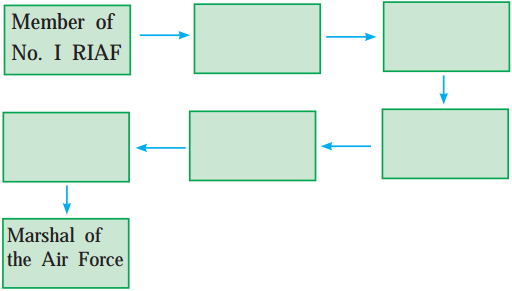
Answer:
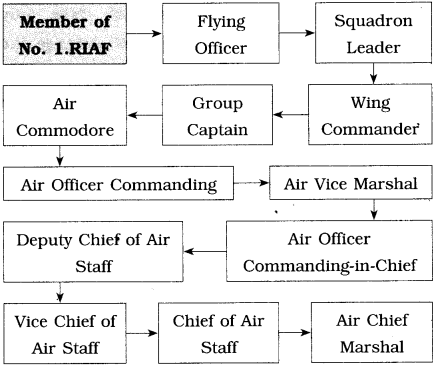
Question 2.
With the help of facts given in the text prepare a Fact file of Air Marshal Arjan Singh.
(a) Date of Birth
(b) Place of Birth
(c) Education
(d) First Assignments
(e) Important posts held
(a) In Air Force
(b) After retirement
(f) Awards
(g) Most outstanding contribution in IAF
(h) Retirement
Answer:
(a) Date of birth: April 15, 1919
(b) Place of birth: Lyalpur
(c) Education: at Montgomery; Empire Pilot Training Course at RAF (Cranwell)
(d) First Assignment: to fly Westland Wapiti biplanes in the North-Western Frontier Province as a member of the No. 1 RIAF Squadron
(e) Important posts held:
(1) In Air Force: Member of No. 1. RIAF, Flying Officer, Squadron Leader, Wing Commander, Group Captain, Air Commodore, Air Officer Commanding, Air Vice Marshal, Air Officer Commanding-in-Chief, Deputy Chief of Air Staff, Vice Chief of Air Staff, Chief of Air Staff, Air Chief Marshal.
(2) After retirement: Ambassador to Switzerland Lieutenant Governor of Delhi
(f) Awards: Distinguished Flying Cross (1944); Padma Vibhushan
(g) Most outstanding contribution in IAF: Transforming the IAF into one of the most potent air forces globally and the fourth biggest in the world.
(h) Retirement: in August 1969.
![]()
Question 3.
Fill in the web.
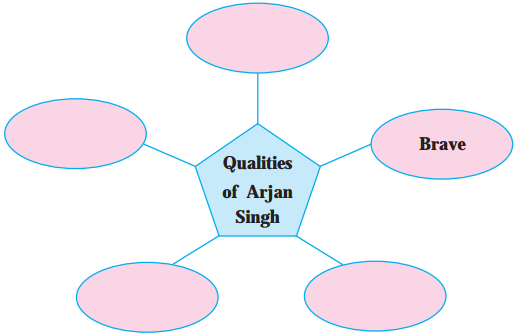
Answer:
(1) Singh had successfully led a young IAF during the 1965 Indo-Pak war.
(2) Singh played a major role in transforming the IAF into one of the most potent air forces globally and the fourth biggest in the world.
(3) Singh was honoured with the rank of Marshal on the Republic Day in 2002.
(4) Singh’s contribution was most outstanding during the 1965 Indo-Pak war.
Question 4.
Say what actions preceded the following promotions of Arjan Singh in his career in the IAF.
(a) Selected for Empire Pilot training course at RAF
(b) Promoted to Squadron Leader
(c) Leader of a flypast of over 100 aircraft at Red Fort, Delhi
(d) Awarded Padma Vibhushan
(e) First Air Chief Marshal of Indian Air Force
Answer:
(a) The authorities selected Singh for the Empire Pilot training course.
(b) He flew against the tribal forces and moved back to No. 1 Squadron as a Flying Officer to fly the Hawker Hurricane.
(c) On 15th August 1947, Arjan Singh achieved the unique honour of leading a fly-past of over a hundred IAF aircraft over the Red Fort in Delhi.
(d) He was awarded the Padma Vibhushan for his astute leadership of the Air Force and for inspiring the IAF to victory in the 1965 Indo-Pak war.
(e) He was a source of inspiration to all the personnel of the Armed Forces through the years.
![]()
Question 5.
Replace the underlined words/phrases with the appropriate ones, to retain the proper meaning.
(be the epitome of, gear up, a brief stint, play a major role, in recognition of, take over reins)
(a) He contributed notably in bringing up the school.
(b) Our school cricket team got ready for the final match against P. Q. R. High School.
(c) After a short period of working as a lecturer, Ravi took up an important post in a multi-national company.
(d) Our class monitor is a perfect symbol of duty and discipline.
(e) Accepting the great value of his research; they awarded him with a Ph.D. (degree)
(f) After the murder of King Duncan, Macbeth took over the control of Scotland.
Answer:
(a) He played a major role in bringing up the school.
(b) Our school cricket team geared up for the final match against P.Q.R.High School.
(c) After a brief stint as a lecturer, Ravi took up an important post in a multinational company.
(d) Our class monitor is the epitome of duty and discipline.
(e) In recognition of his research, they awarded him with a Ph.D. (degree)
(f) After the murder of King Duncan, Macbeth took over the reins of Scotland.
Question 6.
Build the word wall with the words related to ‘Military’.

Answer:
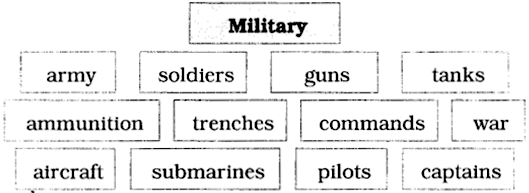
Question 7.
(A) State the different meanings of the following pairs of Homophones and make sentences of your own with each of them.
| Word | Meaning | Sentence |
| (a) led lead(b) role roll(c) air heir(d) feat feet (e) reign | ………………………….. ………………………………………………………… ……………………………………………………… ………………………………………………………. ………………………….. ………………………….. | ………………………….. ………………………………………………………. ………………………………………………………. ………………………………………………………. ………………………….. ………………………….. |
Answer:
| Word | Meaning | Sentence |
| (a) led | past participle of lead (to guide or conduct) | The captain led his team to safety. |
| lead | graphite used as part of a pencil | Do you have a lead pencil? |
| (b) role | a part (in a play, film, etc.) | Marie got the leading role in the new movie. |
| roll | move in a particular direction by turning over and over | The boy wanted to roll in the mud while playing. |
| (c) air | the invisible gaseous substance surrounding the earth | There Is a lot of humidity in the air during the monsoon. |
| heir | successor or inheritor | The family did not know who the heir to the property was. |
| (d) feat | a great achievement | Climbing Mt. Everest is a feat. |
| feet | a unit of measurement | The girl saw to her shock that the lion was only a few feet away. |
| (e) reign | rule as king or queen | Queen Elizabeth’s reign has been a long one. |
| rein | a restraining influence | The new manager kept a tight rein on her employees. |
| rain | water that falls In drops from clouds in the sky | Children love to play in the rain. |
![]()
(B) The following Homographs have the same spelling and pronunciation but can have different meanings. Make sentences of your own to show the difference.

Answer:
(a) firm: (i) My neighbour recently Joined an electronics firm as Sales Executive.
(ii) Many people feel that they must be firm with their children when they are growing.
(b) train: (i) The train left from platform 2 at seven p.m. sharp.
(ii) You must always train your pets to obey you.
(c) type: (i) The man asked his secretary to type the letter immediately.
(ii) Cows eat only a particular type of grass.
(d) post: (i) My aunt quit her job because she felt that the post was not suitable for her.
(ii) The little boy ran to the post office to post the letter to Santa Claus.
(e) current : (i) The minister was disturbed when he read about the current situation of unrest In the country.
(ii) It is a difficult task to row against the current in a river.
Question 8.
Glance through the text and prepare notes from the information that you get. Take only relevant points. Don’t use sentences. Arrange the points in the same order. You may use symbols or short forms. Present the points sequentially. Use highlighting techniques.
Answer:
Air Force Marshal Arjart Singh—Icon of India’s Military History
1. Date of Birth: 15 April, 1919
2. Qualifications: Empire Pilot Training Course at RAF (Cranwell)
3. Responsibilities:
- first assignment to fly Westland Wapiti biplanes in No.l RIAF Squadron
- brief stint in No.2 RIAF Squadron; moved back to No. 1 RIAF Squadron as Flying Officer
- overall commander of ‘Shiksha’
- led the IAF during the 1965 Indo-Pak war
- led a squadron against the Japanese during the Arakan Campaign; assisted the advance of Allied Forces to Yangoon
- led a fly-past on August 15, 1947
- commanded Ambala in the rank of Group Captain; took over as AOC of an operational command
- took over reins of the IAF
- ambassador to Switzerland; Lieutenant Governor of Delhi
![]()
(4) Achievements:
- selected for the Empire Pilot Training Course at RAF (Cranwell) in 1938, at age 19
- promoted to the rank of Squadron Leader in 1944
- led a fly-past over the Red Fort on August 15, 1947
- promoted to the rank of Wing Commander; promoted to the rank of Air Commodore in 1949
- longest tenure as AOC (1949-1952 and 19571961)
- appointed as Deputy Chief of Air Staff at the end of the 1962 war; appointed as Vice Chief of Air Staff in 1963
- rank of Air Marshal in August 1964; took over reins of IAF
- successfully led the IAF in 1965 Indo-Pak war
- promoted as Air Vice Marshal; appointed as AOC-in-C of an operational command
- first Air Chief to keep his flying currency till his CAS rank; has flown more than 60 different types of * aircraft
- first and only Air Chief Marshal of the IAF
(5) Awards:
– Distinguished Flying Cross (1944)
– Padma Vibhushan
(6) After retirement: Ambassador to Switzerland; Lieutenant Governor of Delhi
(Students can put these points attractively in boxes and use highlighting techniques.)
Question 9.
Develop a story suitable to the conclusion/end given below. Suggest a suitable title.
………………………………………………….. (Title)
…………………………………………………………………………………………………………………..
…………………………………………………………………………………………………………………..
…………………………………………………………………………………………………………………..
…………………………………………………………………………………………………………………..
…………………………………………………………………………………………………………………..
…………………………………………………………………………………………………………………..
………………………………………………………….. and so, with tears of joy and pride, the 10 year old Sanyogita More received the National Bravery Award from the Prime Minister.
Answer:
A WONDERFUL ACT OF BRAVERY
It was the 26th of July in Mumbai. It was raining cats and dogs. Ten-year-old Sanyogita More stood at the door of her hut. The street was flooded with water. Sanyogita was frightened. Her parents had not returned from work and she was all alone.
Suddenly, she saw two little boys, Rohan and Sohan, come out from the neighbouring hut to play in the water. As Sanyogita watched, there came a sudden gush of water and the boys were dragged towards an open manhole, which had been marked with a pole. They caught hold of the pole, but the pole began to tilt. It would soon fall—and the boys would go down the manhole!
![]()
Sanyogita ran as fast as she could towards the boys. Pulling a rope from a nearby door, she looped it around a large stone. She held onto the rope and extended her hand towards the boys. “Catch my hand, Sohan, Rohan,” she shouted. “Catch! Catch soon!”
The boys were in a panic but they did as they were told. Sohan held Rohan’s leg, Rohan held Sanyogita’s hand, and Sanyogita held onto the rope.
“Help! Help! she shouted, knowing that if the rope broke or the stone was dislodged, they would all go into the manhole.
She stood there shivering, her arms numb, for nearly 15 minutes before help arrived. Sanyogita collapsed after the incident. The news of her brave deed spread far and wide, and reached the ears of 1 the Prime Minister, who decided to honour her with an award. And so, with tears of joy and pride, the 10- I year-old Sanyogita More received the National Bravery ‘ Award from the Prime Minister.
Question 10.
You wish to join any one of the Indian Armed Forces. Fill in the following application form.
To
The Advertiser
N/AF Recruitment Service
Purangaon – 456 789
Affix recent
passport size
photograph
Application For Recruitment
Rect notice No 1234
1. Post applied for
2. Name and surname of Candidate (in Block letters)
3. Father’s Name ………………………………… Mother’s Name …………………………………
4. Date of Birth
5. Contact details :
Tel. No. (Res) ………………….. . Mobile No.
Email ID ………………….. .
6. Permanent Address :
House No./Street/Village ………………….. .
Post Office ………………….. .
District ………………….. State ………………….. .
Pincode ………………….. .
7. Educational Qualifications :
| Serial Number | Qualification | Name of School/College | Name of Board/University | Percentage obtained |
8. Whether registered at any employment exchange Yes/ No ………………….. (If yes, mention registration number and the name of the Employment Exchange.)
9. Outstanding achievements in extra-curricular activities/ sports/ games, etc.
………………………………………………………………………………………………………………………………………….
………………………………………………………………………………………………………………………………………….
10. Why you wish to join Armed Forces. …………………………………………………………………
………………………………………………………………………………………………………………………………………….
………………………………………………………………………………………………………………………………………….
English Kumarbharati 10th Digest PDF
- Where the mind is Without fear 10th English Textbook Solutions
- The Thief’s Story 10th English Textbook Solutions
- On Wings of Courage 10th English Textbook Solutions
- All the World’s a Stage 10th English Textbook Solutions
- Joan of Arc 10th English Textbook Solutions
- The Alchemy of Nature 10th English Textbook Solutions

